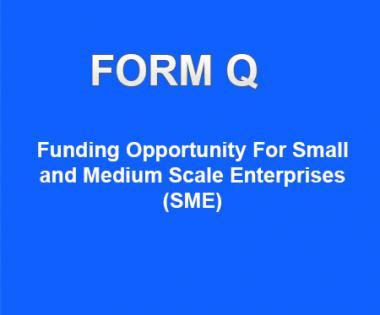
What You Need to Know about Form Q and SME
On the 20th of April, 2017, the Central Bank of Nigeria introduced Form Q for Small and Medium Scale Enterprises (SMEs)to increase Foreign Exchange liquidity and improve access to foreign Exchange.
The form has been designed to reduce excessive documentation requirements by this sector. One can obtain the form at the Fund Transfer Unit or Foreign Operation Unit of any bank.
However, the Form Q to be obtained from the Authorised Dealers (the banks) should be;completed by all SME applicants subject to the following conditions:
- Applicants must be account holders with the processing Authorised Dealers and must have operated an account for not less than six (6) months.
- Applicants must submit a written application letter
- Provision of Proforma Invoice (PFI) from the supplier
- Provision of suppliers'/beneficiary's bank account details.
Unlike FORM M, this will lessen the challenges encountered by the SMEs and improve retail business access to the foreign exchange market.
Comments
uktnpyzn
[url=https://azithromycinmds.com/]zithromax 500 mg lowest price drugstore online[/url]
Cqnvzm ykaswo
ketoconazole online buy - buy nizoral 200 mg generic buy sporanox without a prescription
zxjdwqti
[url=http://bestprednisone.online/]where can i buy prednisone without a prescription[/url]
Understanding the complex world of chronometers
Brands that manufacture chronometer watches
Understanding COSC Validation and Its Importance in Watchmaking
COSC Accreditation and its Rigorous Standards
COSC, or the Official Swiss Chronometer Testing Agency, is the official Swiss testing agency that verifies the precision and precision of timepieces. COSC certification is a sign of excellent craftsmanship and reliability in timekeeping. Not all timepiece brands follow COSC accreditation, such as Hublot, which instead sticks to its proprietary stringent standards with movements like the UNICO, achieving comparable precision.
The Art of Precision Chronometry
The central mechanism of a mechanical watch involves the mainspring, which provides power as it loosens. This system, however, can be prone to environmental factors that may impact its accuracy. COSC-certified movements undergo strict testing—over fifteen days in various conditions (5 positions, three temperatures)—to ensure their resilience and reliability. The tests measure:
Average daily rate precision between -4 and +6 secs.
Mean variation, peak variation rates, and effects of thermal changes.
Why COSC Certification Matters
For timepiece enthusiasts and collectors, a COSC-validated watch isn't just a item of tech but a testament to enduring excellence and accuracy. It signifies a watch that:
Offers excellent dependability and accuracy.
Ensures confidence of superiority across the entire design of the watch.
Is probable to maintain its worth more efficiently, making it a sound investment.
Well-known Chronometer Manufacturers
Several well-known manufacturers prioritize COSC certification for their timepieces, including Rolex, Omega, Breitling, and Longines, among others. Longines, for instance, provides collections like the Record and Spirit, which showcase COSC-accredited movements equipped with innovative substances like silicon equilibrium suspensions to boost durability and performance.
Historic Background and the Development of Timepieces
The idea of the timepiece dates back to the need for exact timekeeping for navigational at sea, highlighted by John Harrison's work in the eighteenth century. Since the formal foundation of COSC in 1973, the certification has become a standard for judging the precision of high-end watches, sustaining a legacy of superiority in horology.
Conclusion
Owning a COSC-certified timepiece is more than an visual choice; it's a commitment to quality and accuracy. For those appreciating precision above all, the COSC certification offers peace of thoughts, guaranteeing that each certified watch will perform dependably under various conditions. Whether for individual satisfaction or as an investment decision, COSC-validated watches distinguish themselves in the world of watchmaking, maintaining on a legacy of meticulous chronometry.
ihnwbthc
[url=http://prednisonecsr.com/]where can i buy prednisone without a prescription[/url]
Txjvob qufemo
famvir order - purchase famvir without prescription order valaciclovir 1000mg online

[url=http://olisinopril.com/]lisinopril 10 mg order online[/url]